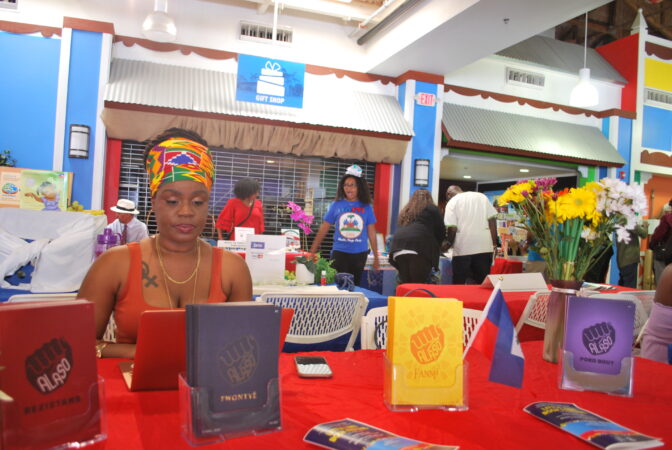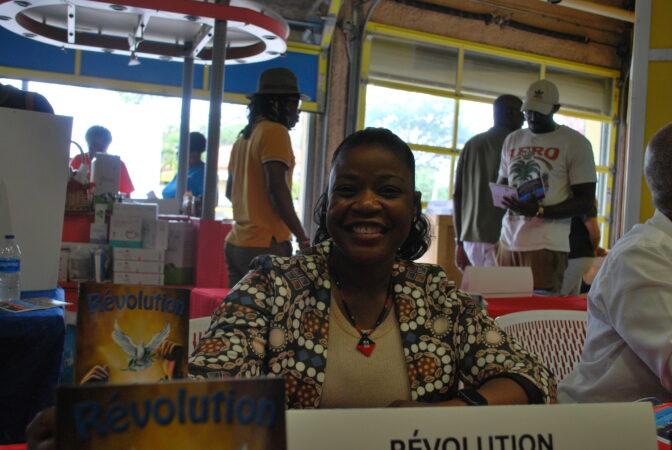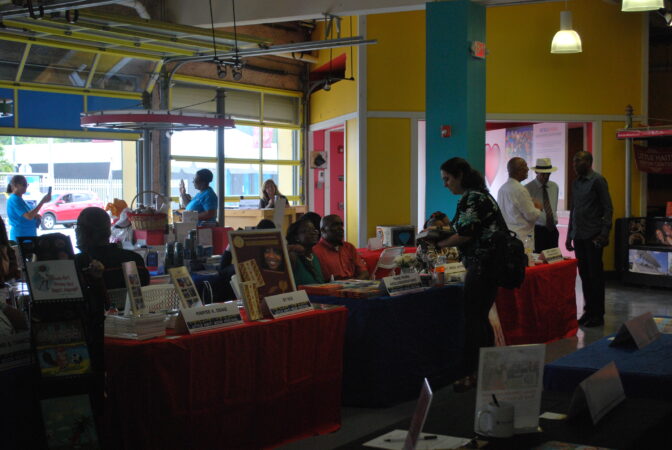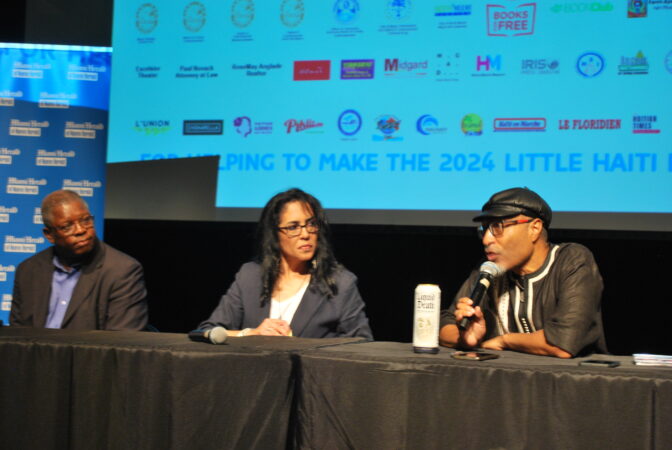With an assortment of vendors that has more than doubled since its inception ten years ago, the festival’s book selection was as diverse as Haitians are.
The Little Haiti Book Festival brings together stories, their tellers and those who appreciate the cultural significance of spoken and written language.
For the 10th edition of the event which took place Sunday, May 5, 2024, the Little Haiti Cultural Center—a venue often at the heart of vibrancy for Miami’s Haitian community—saw an explosion of diversity, fueled by a packed crowd and a constellation of authors’ books.
With an assortment of vendors that has more than doubled since its inception ten years ago, the festival’s book selection was as diverse as Haitians are.
Yvette Leroy, for instance, who published “Wanègès,” is also the author of “Nostalji”, a book of poetry and short stories, published in 2016.
Leroy says she has attended the festival since it started in 2014 and that the event is “extraordinary” for the Haitian community.
Seated next to Leroy in the marketplace was Pascale Solages, the co-founder and general coordinator of the feminist organization Nègès Mawon.

Pascale Solages, co-founder and general coordinator of Nègès Mawon, at the Little Haiti Book Festival selling books for her organization. | © Philippe Henold Buteau/Ayibopost
Solages attended the book festival to add to feminist voices among Haitians and to raise money for the organization with the selling of four of their books. “Rezistans,” “Fwontyé,” “Fanmi” and “Poko Bout” feature works from several writers such as Edwidge Danticat.
“It is important to feature the voice’s of Haitian women in Haiti and the Diaspora,” says Solages.
As Haiti is going through its struggles—much of which falls on the heads, shoulders and carrying capacity of women and children—Jean Th. Lindor was at the festival for his book “Le Cri du Cœur” or “The Crying of The Heart” which is a collection of poems.
“Everyone must engage with Haiti for the country to shine,” Lindor says, stressing Haiti is a good country full of riches.
Haiti is going through what is probably its worst political and humanitarian crisis since the devastating earthquake of 2010.
That has led to migration out of the country which can be troublesome for many. Cultural differences, the requirement to motivate oneself or other societal expectations can be challenging to adapt to.
Johanne Exilus knows this and wrote “Révolution” to help its readers self-motivate.

Johanne Exilus, author of Revolution, a book of poetry and motivation for its readers at the Little Haiti Book Festival. | © Philippe Henold Buteau/Ayibopost
The book includes poetry and Exilus says she hopes to help get readers out of their zone of comfort.
“The book will tell you how to stay strong and how to overcome challenges,” Exilus offers.
Exploring challenges children face, Kisha Bazelais says the book she co-authored with her husband is about teaching confidence.
Bazelais says the book, “Ayo’s Life Lessons: The Barbershop” is meant to help teach kids to speak for themselves. The barbershop is used as a backdrop.
Another married couple who worked on a book together are Akilah Passe and her husband, Max Passe. Together with their children they created “Ocean Heroes.”
Read also : Tanael Joachim: “If I was still in Haiti, I would not be doing comedy”
The characters on the cover—Ethan the protector and Alayla the goddess of the sea—are based on Akilah and Max’s children. Ethan and Alayla also helped create the journal in the book. Akilah explains that Black people should be the superheroes and not an afterthought.
“It’s a really fun, fantasy, adventure way to get kids interested in preserving and protecting the oceans,” Akilah adds.
Protecting heritage and culture is the focus of both of Djenane Saint Juste’s books — “The Mermaid and The Whale,” and “Ti Sonson ak Pouvwa Tanbou.”
“The Mermaid and The Whale” is about the island of La Gonave, and “Ti Sonson ak Pouvwa Tanbou” is meant to celebrate the tanbou (traditional drums) and Fort Jacques, a historic site located in the mountains of the capital.
Saint Juste likens the tanbou to Haitians’ first cell phone.
“[It was] our first means of communication from one mountain to another, to get the maroons ready for the revolution without the colonizers understanding,” Saint Juste explains.
“Ti Sonson ak Pouvwa Tanbou” also features a CD of original music, and Saint Juste worked with Haitian illustrators for the artwork in the book.
Read also : Wyclef Jean au cœur du brunch caritatif des Chefs de la Caraïbe
Haiti and Haitian culture being the shared theme of the book festival also meant that things featured in one book could be more prominent in the work of a different author.
“Spiritual Fasting” by Langlichmie Normile centers on the practice in vodou involving fasting.
In the book, Normile discusses why fasting is important. She also touches on the significance of clothes in vodou by identifying what the outfits mean and providing meaning to the use of colors.
Walking around the Little Haiti Cultural Center, attendants of the festival could see more color than usual with colorful lawn chairs and umbrellas set up in the courtyard.
The festival was launched by Libreri Mapou owner, Jean Mapou, who says he started the festival to give some life to the community because it is slowly dying.
“Developers are taking over, the culture here is disappearing,” Mapou confides.
The Little Haiti Book Festival is now in partnership with the Miami Book Fair, which helps to secure grants. From the 10 to 15 vendors the festival started with, this year Mapou says there are over 100.
As book vendors waited patiently, hoping for potential buyers in the lobby in front of the auditorium and the marketplace, food vendors lined up around the building.

Part of the marketplace of the Little Haiti Cultural Center where books were on sale by their authors. | © Philippe Henold Buteau/AyiboPost
The event was tuneful. Vendors not only sold books and food, but there were also vendors for frozen drinks, clothes and accessories, soap, lotion, cosmetic products and paintings.
In the community room, there were workshops and a place for kids was set up called the children’s alley.
According to District 2 County Commissioner, Marlein Bastien, the festival is comprehensive.
“Everywhere you look there are activities for adults and children,” Bastien says after leaving the second of two panels which took place in the auditorium.
The first panel was about AI in the Arts and provided cautionary commentary about the effect of bias in the development of AI—where the technology is primarily developed by rich white men. Caution regarding the training of tools such as ChatGPT was also explored—where writers have asked for their work to be pulled and not be used by the models.
One of the panelists nonetheless offered that ChatGPT can be used to add to artists’ brand voice or brand identity. ChatGPT is useful, another panelist said, in that it might capture the literal meaning of words, but it would not do so for all that goes into poetry.
The second panel challenged both the panelists and the audience, as the discussion broached the topic of honesty in the media, considering expectations from the specific readers and listeners upset Haitians.

Panelists of the Haiti in the Media panel – from left to right – Patrick Eliancy, news director of Island TV; Elizabeth Guerin, producer and radio and TV host and co-owner of Island TV and owner of ImaginArt Media Productions; and Jafrikayiti, writer and radio host. | © Philippe Henold Buteau/AyiboPost
Jacqueline Charles, foreign correspondent for The Miami Herald, introduced the panel discussion delving into the woes facing local reporting in Haiti: Le Nouvelliste’s printing press was attacked, Radio Caraibes was forced to move, and six journalists in Haiti were killed in the last three years.
The pains of local reporting—which adds to the information available to organizers, activists, and voters—are then felt through the audience who expect reporting about Haiti from mainstream outlets to be as in depth as what has been talked about among Haitians.
Charles had to defend herself and correct the record on information about the Presidential Transitional Council; created with a two-year timeframe to select a president and a prime minister, and organize elections in Haiti. Even though most Haitians will not have a say as far as who the council’s president will be—with no parliament in the interim.
Read also : This Port-au-Prince bookstore makes reading more affordable
The panel was as lively and as heartfelt as most political discussions are involving Haiti.
Afterwards, towards the end of the festival, Inez Barlatier performed with her children’s band Tati Nuzi and Friends. Barlatier has performed at the festival previously, but it was her first time performing as a member of a children’s band.
Barlatier says she was happy to be there, and that the festival is incredible for highlighting artists.
“Things like this remind us that what we have here we need to save,” Barlatier added.
Cover Image : The children’s group Tati Nuzi and Friends performs at the 10th edition of the Little Haiti Book Festival on May 5, 2024. | © Philippe Henold Buteau/AyiboPost
Keep in touch with AyiboPost via:
► Our channel Telegram : Click here
► Our Channel WhatsApp : Click here
► Our Community WhatsApp : Click here







Comments